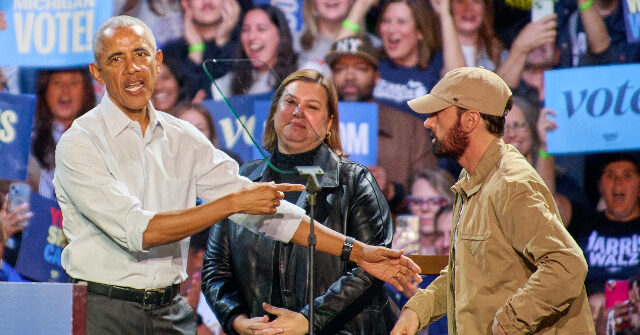In recent discussions surrounding former President Donald Trump’s comments about Liz Cheney, allegations have emerged suggesting Trump called for her execution. However, these claims have been discredited as media misinterpretation of his remarks. The narrative draws a stark contrast with past sentiments voiced by well-known figures supporting Vice President Kamala Harris, including Eminem, who once expressed a desire for violence against former Vice President Dick Cheney in a song. The lyrical content of the track “Rap Game” contains explicit references to violence directed at Dick Cheney, which, according to some interpretations, also reflects animosity toward his daughter, Liz Cheney, and her sexuality, making it a charged statement within the larger political discourse.
Trump’s comments, taken from a recent speech, critiqued Liz Cheney’s support for military involvement abroad and her perceived indifference to the dangers faced by troops. He referred to her as a “radical war hawk,” suggesting that her rhetoric would shift dramatically if she were faced with the gruesome realities of warfare. Trump elaborated on his criticism by portraying a hypothetical scenario where Cheney is amidst combat, highlighting the disconnect he perceives between policy discussions in Washington and the actual experiences of soldiers. His illustrative language, meant to incite reflection rather than violence, seemed lost on those eager to mischaracterize his intent.
In a political climate rife with hyperbole, media outlets and Democratic representatives, including the Harris campaign, leaned into a more sensational interpretation of Trump’s sentiments. They insinuated that his colorful remarks equated to a call for violent retribution against Cheney. However, such an assertion has been countered by analysts who clarify that Trump was invoking a common critique of Cheney as a “chickenhawk,” a term traditionally used to describe those who advocate for war while avoiding military service themselves. This interpretation reframes Trump’s comments as a robust political critique rather than a violent threat.
Zack Beauchamp, a senior correspondent at the left-leaning outlet Vox, provided a significant rebuttal to the claims against Trump, emphasizing the need to examine the broader context of his statements. He argued that labeling Cheney as a “chickenhawk” showcases a longstanding criticism, particularly among those positioning themselves against military intervention but without firsthand experience. Beauchamp’s analysis underscores the importance of content and dialogue in political discussions, especially when fueled by misinterpretation or deliberate obfuscation by adversaries.
Drawing parallels between these two narratives highlights the complexities of political rhetoric in America today. Eminem’s past advocacy for violence towards Dick Cheney starkly contrasts with Trump’s criticisms of Liz Cheney. While Trump’s statements focused on a debate about military policy and its advocates, Eminem’s lyrics navigated into territory that calls for violence, reflecting a more visceral anger towards political figures. This divergence illustrates how various expressions of dissent, whether through artistic mediums or political speeches, can contribute to the animated climate of American politics.
In conclusion, the escalation of rhetoric surrounding Trump and Liz Cheney is symptomatic of broader trends in political discourse, where words are often weaponized and misrepresented. In juxtaposition, Eminem’s historical comments about Dick Cheney illustrate the long-standing frustration with certain political figures, which can sometimes drift into violent imagery. Rather than a straightforward narrative pitting left against right, these discussions reveal a nuanced landscape where political commentary, emotional responses, and artistic expressions intersect, reflecting the highly charged environment in contemporary America.

